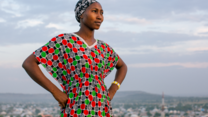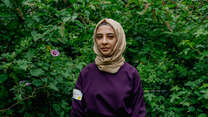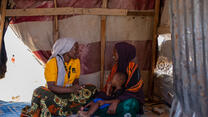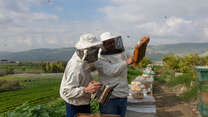The Syria crisis, now in its sixth year, has left millions displaced from their homes, seeking refuge from the violence of war. Refugees in host countries like Jordan and Lebanon are desperate to rebuild their lives, but face significant barriers to finding employment. Without livelihood opportunities, refugees and host communities are unable to meet their basic needs and support their families. Accessing safe employment remains one of the most pressing challenges for communities affected by displacement.
The IRC recently undertook research released in Beyond Survival: Refugees’ Pursuit of Livelihoods in Jordan and Lebanon, focused on the struggles of refugees to earn a living wage working to survive and recover from the shock of conflict and displacement. The recommendations made below are direct result of a series of interviews and research that took place over the course of the last 6 months. In addition to these recommendations it’s important to keep focus on the stories of those most affected by this crisis - while conducting this research we met Um Laith (name has been changed), a 39 year-old mother with five children who escaped from from Dara’a, Syria, and now lives in Irbid, Jordan. Um Laith was a teacher in Syria, where she also grew and sold fruits and vegetables, and helped with her husband’s bee-keeping business. With her husband disabled and unable to work, Um Laith struggled to meet the basic needs of her family and had trouble finding work when she first arrived in Irbid. With the help of IRC’s Managing Your Finances training and business support, she has started her own bee-keeping business and has been able to support her four children who are in school with her own earnings. Even more, Um Laith’s business supports the community too—her bees work day in and day out to pollenate local fruit farmers’ trees. She told us that counselling services have helped her “stay strong… to support [her] children and husband,” and that starting her own business has helped her rebuild her life.
“We don’t want … an aid package here and there. We want to work, to produce. We want to live a normal life, like other people.”
Um Laith, like many refugees we met in Jordan and Lebanon, started her own business and sees her job as a critical first step towards finding stability. But there are still many challenges ahead for Um Laith and other Syrian refugees in Jordan with home businesses. For example, Um Laith must obtain a work permit from the Government of Jordan to formally operate her business. For now, however, she believes securing a permit or registering her business would be complicated and possibly dangerous. Research shows that women like Um Laith need stronger protections against exploitation and abuse by work permit sponsors.
Based on our research, informed by focus group discussions and key informant interviews, we have identified five key recommendations for host country governments, humanitarian actors, and donors to address the barriers to sustainable livelihoods in Jordan and Lebanon. The IRC will be working to address these barriers and pushing forward recommendations through its continued direct programming on the ground and it’s research and development project focused on job creation – Million Jobs Challenge.
- Refugees and the communities that host them, should have access to supportive legal frameworks that facilitate livelihood opportunities. Gaining access to legal residency and work permits remain difficult processes that require extensive documentation and lengthy bureaucratic procedures. Facilitating the legal right to work is an important step to allowing refugees to participate fully in the labor force with appropriate protection from deportation or abuse by employers. To support the governments’ efforts in streamlining the legal requirements for work, NGOs and civil society actors must also partner to share information with communities to ensure that they are supported.
- It is critical to provide refugees and host community members with the resources and support to start their own businesses, as Um Laith’s experience demonstrates, refugees benefit greatly when they are connected with opportunities to support themselves. Refugees face a daunting and confusing business registration process in both Jordan and Lebanon, with inconsistent implementation. Governments can spur job creation that supports not only individuals, but communities as a whole, by streamlining the business registration process and making the process easily accessible, particularly for vulnerable populations. Donors and NGOs can support job creation by investing in and implementing programs that improve access to employment, such as those that facilitate access to financing for home-based businesses or that teach financial literacy. For example, through livelihood and women centres as well as through local partners in both Lebanon and Jordan, the IRC provides skills and business management trainings, and supports refugees and vulnerable communities to access apprenticeships, short-term cash for work, and self-employment through home-based businesses.
- Governments and humanitarian organizations must work to ensure refugees and host community members are protected from exploitation and abuse. Even once permits or residency is obtained, refugees still face challenges to maintaining their livelihoods due to abuse by employers or landlords who sponsor their work permit, which is particularly dangerous for vulnerable women and children. NGOs and humanitarian actors have been instrumental in connecting refugees and host communities with appropriate legal and case management services, and must continue their efforts. These referrals are especially important as new employment policies are put into place.
- NGOs can help to demystify the legal context, enhance transparency, support scale and access to job creation initiatives and connect hosts and refugees in mutually beneficial ways. While Jordan and Lebanon make progress in gaining access to European markets, attracting investment and fostering business growth through special economic zones, they should also avail themselves of an underappreciated ally in the effort to increase employment: civil society. The governments will still be the majority partner in the relationship, and should continue to regulate NGO activities to ensure quality and conformity to national priorities. It is time to unlock the potential of the non-profit sector as a critical facet of public-private partnerships and of ensuring those most vulnerable gain access to new job creation initiatives.
- Governments have made progress on their commitments to supporting livelihoods in the region—but more action is needed. Following the Supporting Syria and the Region Conference held in February 2016, the Government of Jordan has issued nearly 26,000 work permits for refugees, and is working towards business regulation reform. Lebanon, stymied by an ongoing constitutional crisis, has made less tangible progress but continues to engage donors around the Statement of Intent made at the London Conference. Although policy changes have not yet reached most refugees, it is clear that the London commitments will continue to serve as the framework for future cooperation. Now, governments, as well as donors, must follow through on their commitments to promote and support livelihood opportunities for more than a million refugees of working age, and host communities.
As a leader in the conversation around improving the lives of people in conflict, the IRC supports the transformational approach envisioned by the Supporting Syria conference. Humanitarian relief and development interventions must go forward together, and the resources of a committed community of nations should support these twin goals. The international community must recognize the urgent employment needs on the ground, while ensuring long-term solutions support the livelihoods of vulnerable communities for years to come. While the scale of the crisis looms large, these employment challenges are manageable if actors come together and act now.



